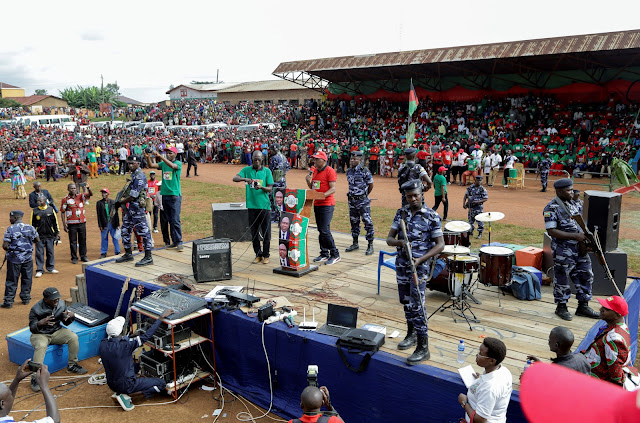By Our Correspondent, BUJUMBURA Burundi
Eastern Africa’s Burundi is set to hold general elections on May 20, where about 5.1 million registered voters are expected to cast ballots to elect a new President, members of National Assembly and district councillors.
 |
| Burundi’s opposition National Freedom Council (CNL), presidential candidate Agathon Rwasa, addresses supporters during a campaign rally in Ngozi province, Burundi April 27, 2020. |
The
following are some basic facts about the election:
The
ruling National Council for the Defense of Democracy-Forces for the Defense of
Democracy (CNDD-FDD) elected its secretary general, Major General Evariste
Ndayishimiye as the party’s presidential candidate.
Under the
new constitution promulgated in June 2018, the presidential term is extended
from five to seven years and allows the president to serve two consecutive
terms.
Opposition
party National Council for Liberty’s Agathon Rwasa is widely predicted to be
Ndayishimiye’s main challenger.
Other
five presidential candidates include current First Vice-President Gaston
Sindimwo from the National Progress Union (UPRONA), former Burundian president
Domitien Ndayizeye from the Kira Burundi coalition.
In a bid
to finance the general elections by Burundi itself and hence getting rid of
possible influence from donors, the government started mobilizing financial
contributions from citizens in 2017.
The May
elections will be followed by the elections of senators and village councillors
that will take place on July 20 and Aug. 24, 2020 respectively.
The
landlocked country will have a new president for the first time in 15 years
since the current president Pierre Nkurunziza from CNDD-FDD will not run for
the presidency.
Burundi
plunged into a crisis in April 2015 when Nkurunziza decided to run his
controversial third term bid, which he won in July 2015. His candidature, which
was opposed by the opposition and civil society groups, resulted in a wave of
protests, violence and even a failed coup in May 2015.
Since
April 2015, 300,000 Burundians had fled to neighboring countries following
election-related violence, according to the UNHCR (Office of the United Nations
High Commissioner for Refugees).
The government has barred the East African Community election observation team by warning them to be subjected to a 14-day mandatory quarantine if they travelled to Burundi; the days could end after election.
An
UN-mandated Commission of Inquiry on Burundi has never been given access to the
country, despite repeated requests. Now WHO officials have been added to the
list of officials barred from the country.
The
overall security of Burundi has improved, and the current situation is
generally stable. Many of Burundian refugees living in other countries have
voluntarily returned.
However, violence among supporters of parties running in the race had occurred during a three-week electoral campaign starting April 27. - Africa

No comments:
Post a Comment